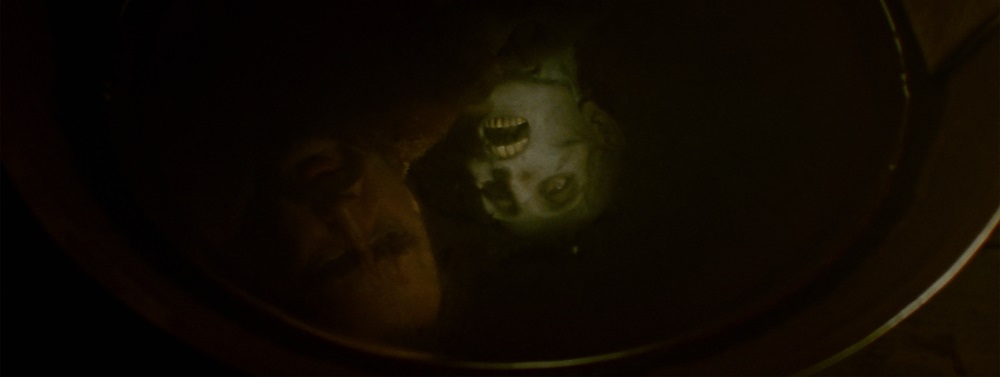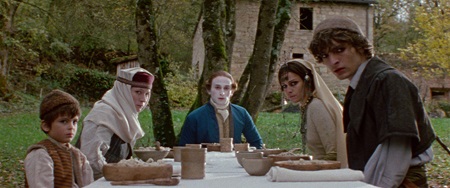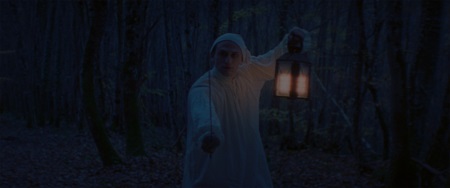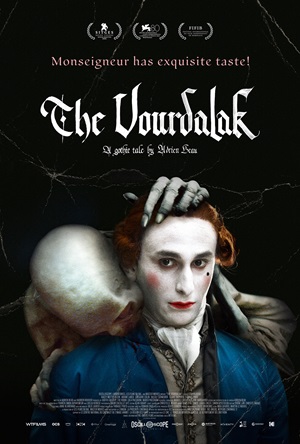
Devilishly Macabre Vourdalak Takes an Inventive Bite Out of Vampiric Convention
French emissary the Marquis Jacques Antoine Saturnin d’Urfé’s (Kacey Mottet Klein) carriage has been ransacked by thieves. He is instructed to find refuge and assistance at the isolated manor of the elderly Gorcha and his family. Once there he finds the man’s three children Jegor (Grégoire Colin), Sdenka (Ariane Labed), and Piotr (Vassili Schneider). Along with them are Jegor’s wife Anja (Claire Duburcq) and their young son Vlad (Gabriel Pavie). But no Gorcha. He is mysteriously absent.
Adapted from La famille du Vourdalak written by Aleksei K. Tolstoï a good 500 years before Bram Stoker published Dracula, the hypnotically bizarre The Vourdalak is a one-of-a-kind supernatural chiller directed with stylish creativity by inventive French newcomer Adrien Beau. It is a lo-fi marvel that utilizes a bevy of intriguing practical makeup and puppet effects to bring its most imposing character, the potentially undead Gorcha (who is voiced by Beau) to life.
The scenario plays out like some surreal combination of Roman Polanski’s The Fearless Vampire Killers, Stanley Kubrick’s Bary Lyndon, Sam Raimi’s The Evil Dead, and Jim Henson and Frank Oz’s The Dark Crystal. The film is a fascinating slice of ungainly foppish terror where idiosyncratically mannered comedy slowly gives way to an all-encompassing form of building dread that caught me by surprise. More importantly, the emotional Greek tragedy of everything that transpires is blatantly and purposefully telegraphed up front, Sdenka letting, not only a clueless Jegor and a questioning Marquis d’Urfé know what will happen if Gorcha returns home, but also the audience.
“Wait six days for me,” recalls Sdenka. “If, after those six days, I have not returned, say a prayer in memory of me, for I shall have been killed in battle. But if ever, and may God preserve you, I were to return after six days have passed, I enjoin you to forget that I was your father and to refuse me entry whatever I may say or do — for then I shall be no more than an accursed vourdalak.”
When Gorcha does appear, it has been after those six days have elapsed. Instead of a man, they are presented with something akin to an emaciated sentient corpse. But he is still the family patriarch, and Jegor refuses to believe his father is a member of the blood-sucking Slavic undead. In Gorcha, he still sees a father. Sdenka and Piotr on the other hand? They know trouble has arrived, and unless they find the courage to do something about it, it’s only a matter of days before they will join their father in zombified purgatory.
All of this is seen through the eyes of the bewildered Marquis d’Urfé. An entitled bourgeois nincompoop, after he’s quickly put in his place after unsuccessfully trying to force himself on Sdenka, he discovers her distaste and disdain for his actions only makes him appreciate the mysterious woman even more. Gorcha sees this immediately, and uses this growing affinity for his daughter against the Frenchman, as love, not thirst, not hunger, is the primary meal upon which he lustfully feeds.
It all grows stranger from there. Beau uses all of this story’s supernaturally insidious trappings to comment on a variety of hot topics, including patriarchal misogyny, classism, and gender identity in several unpredictably imaginative ways. An entire subplot concerning the ghoulish father’s relationship with the effeminate Piotr is a distastefully perceptive highlight. Gorcha’s treatment of his youngest son is eerily and uncomfortably similar to how a stereotypical close-minded 21st-century ideologue browbeats, ridicules, and ultimately tries to condemn an LGBTQ+ child to the point they either rush back into the closet in petrified shame or appallingly takes their own life in response to these insidious conversionary tactics. It’s marvelously upsetting stuff.
Gorgeously shot in 16mm by award-winning cinematographer David Chizallet (Mustang) and featuring stunning production design, art direction, costume design, and makeup effects, the best bit of movie magic is the one item that is shrewdly the most noticeably goofy aspect of the entire motion picture. Gorcha is brought to life by a life-size marionette. He’s not remotely believable. It’s obviously a puppet. And yet, this day-walking demon is tremendously disturbing. Gorcha instantaneously casts a delectably devilish spell, and it was not long before my initial giggles at his appearance quickly transformed into hushed internal hollers of pain and heartbreak toward all of the hellacious evils he was about to inflict upon his loving family.
With The Vourdalak, Beau announces himself as a filmmaker of confident and resourceful substance. He takes a familiar vampiric tale and makes something fascinatingly original out of it. Flippant humor slowly gives way to an unavoidable onslaught of anxiety that overwhelmed my senses, leading to haunting final images I will uncomfortably savor for quite some time. I doubt I’ll see anything else even remotely like this one, especially as a theatrical release, at any point throughout the remainder of 2024.
Film Rating: 3½ (out of 4)







